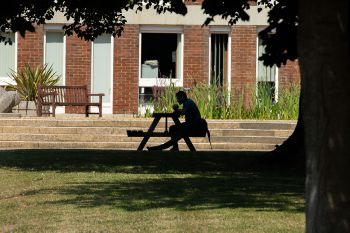Staff survey update: How MAH is helping to bridge the gap between colleagues
Posted on behalf of: Laura Gallaher – School of Media, Arts and Humanities
Last updated: Thursday, 18 January 2024

The School of Media, Arts and Humanities has been taking action to improve the staff experience following feedback from previous staff surveys. Workload and staff development were two areas of focus for the School – find out in this article how we are making changes as a result.
Reducing workload and improving transparency
Unmanageable workloads and the perception that work was not allocated evenly had contributed to a drop in staff morale. Staff surveys identified a need to reduce workload and improve the transparency of work allocation.
Meetings across the School were reviewed and condensed if possible, and some committees were merged to avoid duplication of effort. We reduced the membership of various groups and cut the frequency of some meetings, dealing with less urgent business via email.
We set up a Planning of Annual Workload (PAW) Working Group, with representation from colleagues at all role levels and across academic and Professional Services (PS) staff. Together they are identifying principles to help improve academic workloads, bring greater transparency of work allocation and prioritise delivery of teaching. Our PAW Principles document has also been shared for consideration for wider use across the University.
The PAW Working Group will submit a report with recommendations to the School's leadership team in February and recommendations will include continuing to streamline non-teaching related duties to rebalance and recognise the time and effort put into the work of teaching.
Increasing opportunities for staff development
Many colleagues, both PS and academic, expressed in their survey feedback that they wanted increased opportunities for staff development. Topics requested ranged from managing workloads and improving support for line managers, to decolonising the curriculum and helping eliminate racial microaggressions from the School’s culture.
As a result, we have developed termly staff development mornings. Some sessions have had an academic focus, some were more targeted to PS colleagues, and several were suitable for both faculty and PS. This has promoted collegiality within the School, enhanced by mixing over lunch after the sessions. These mornings have started to bridge gaps between academic and PS staff and provided a shared space for both learning and social interaction.
We have also introduced a series of induction sessions for new subject heads and a programme to support development of PS line managers in building and supporting teams. These sessions have been welcomed and feedback suggests they provide a valuable starting point for individual staff development, team building and improving management skills. Many colleagues have fed back that they have noticed patterns of behaviour in themselves and others more, were able to recognise differences of perspective and understand others’ views better. A key learning was recognising where we can exercise influence while accepting that we cannot control everything – and understanding that it is natural to alternate between feelings of acceptance and feelings of resistance.
Collectively, these actions have contributed to a positive change in the workplace culture within the School which we believe is now more inclusive, welcoming and responsive to staff needs and concerns. We look forward to progressing these actions further in the spring.
If you would like more information about these initiatives, please contact Laura Gallaher at: l.gallaher@sussex.ac.uk.
About our staff survey updates
Two case studies will be published each month, highlighting how a School and a PS Division are using feedback from our staff survey to improve the staff experience. Look out for our next update later this month.
